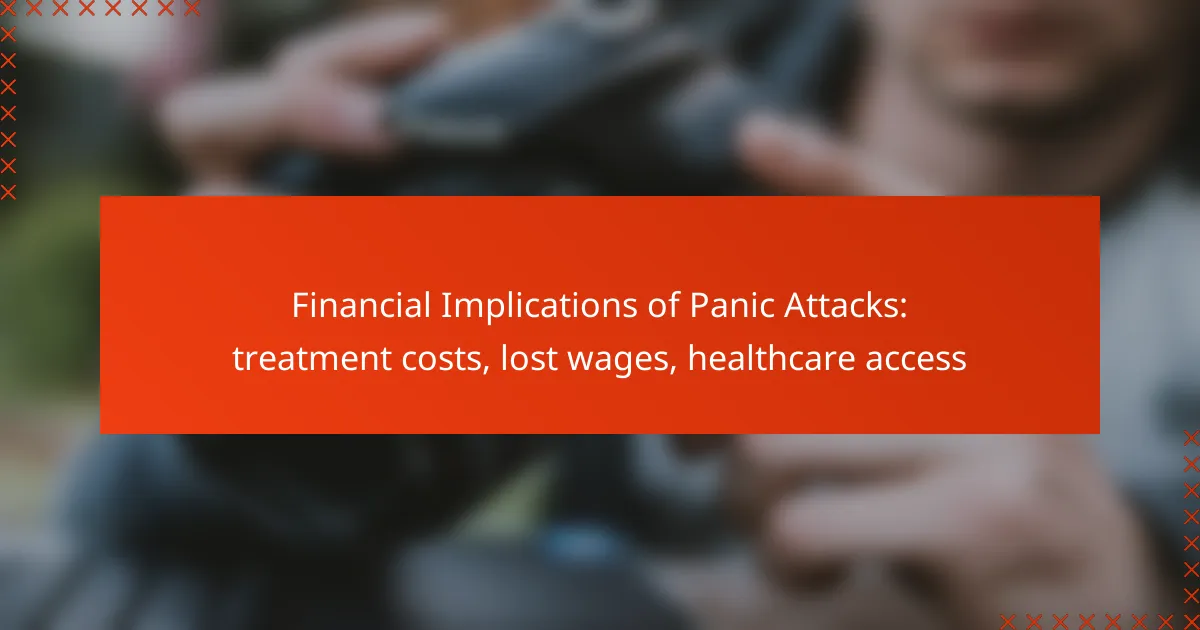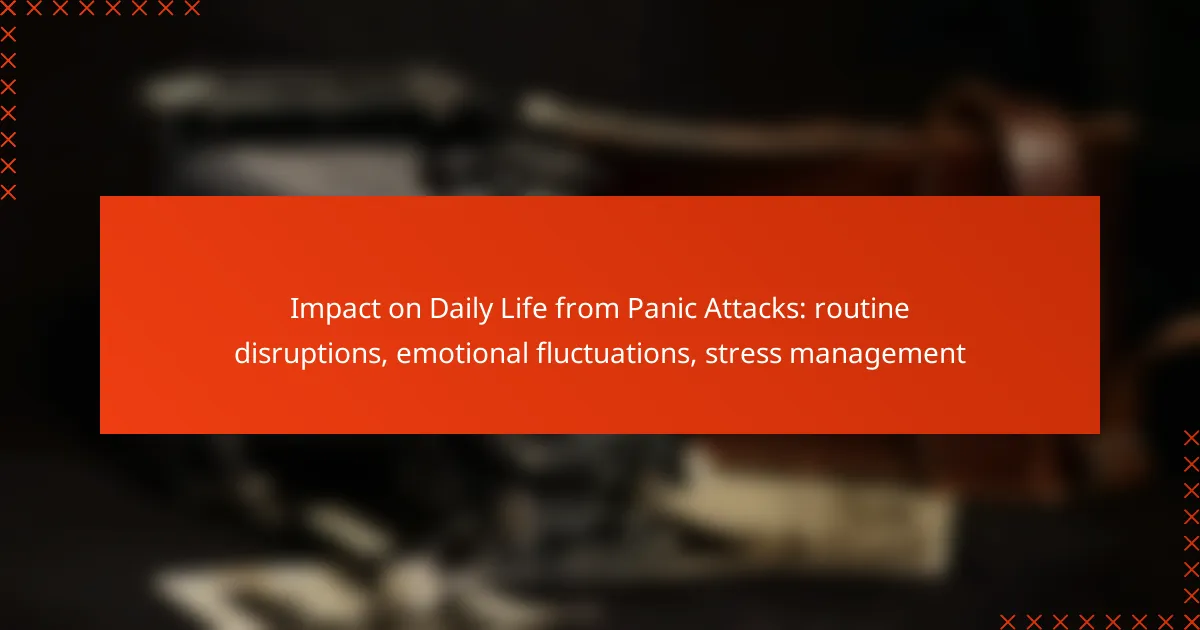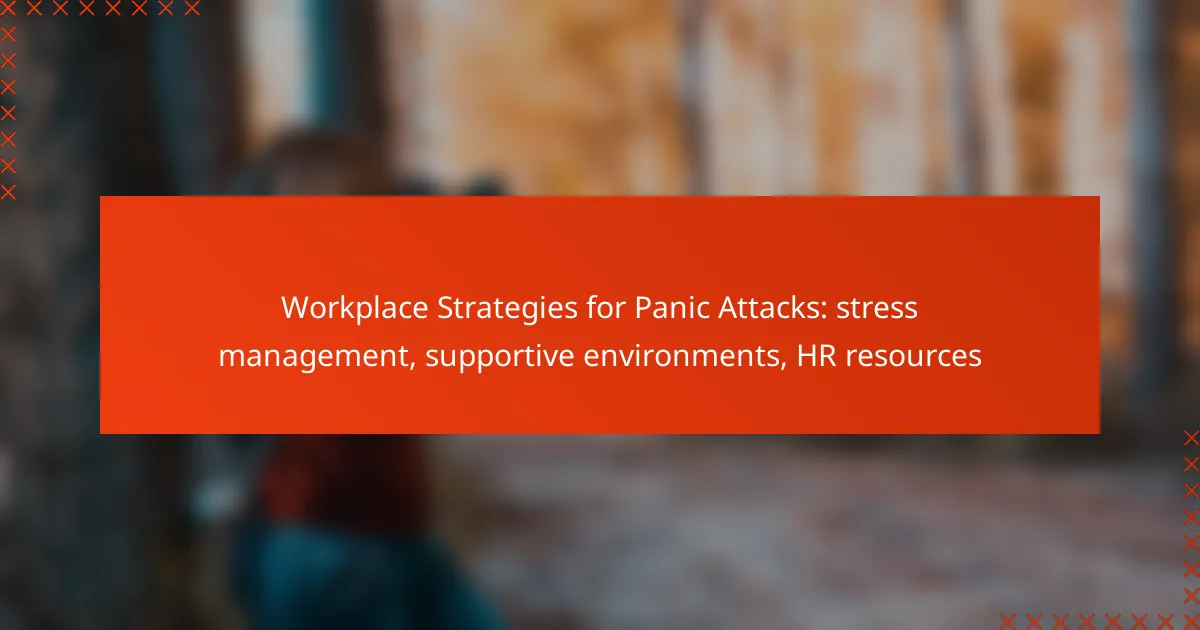Panic attacks not only affect mental health but also impose significant financial burdens on individuals. The costs associated with treatment can vary widely, influenced by the choice between public and private healthcare, as well as the type of therapy or medication required. Additionally, the impact on employment, including lost wages due to absenteeism or job loss, further exacerbates the financial strain faced by those suffering from panic attacks.
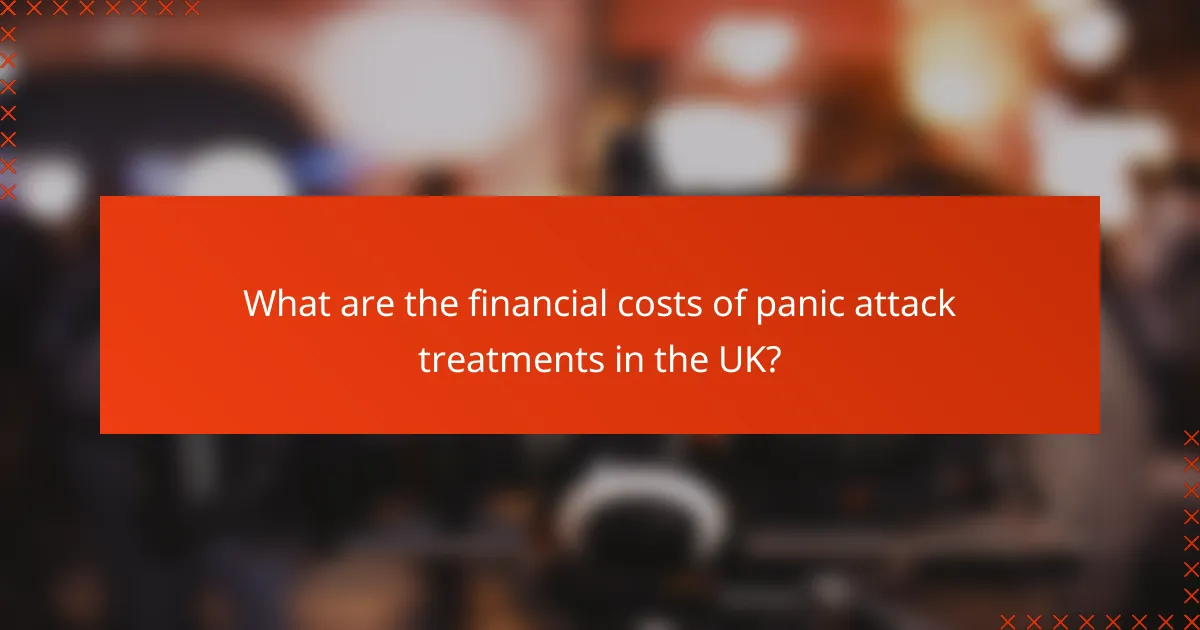
What are the financial costs of panic attack treatments in the UK?
The financial costs of panic attack treatments in the UK can vary significantly based on the type of treatment, duration, and whether the patient opts for public or private healthcare. Patients should consider therapy, medication, and potential long-term care expenses when evaluating their financial commitment.
Average therapy session costs
The cost of therapy sessions for panic attacks typically ranges from £40 to £100 per session in the UK. Many therapists offer a sliding scale based on income, which can help those with limited financial resources. It’s advisable to check if the therapist is accredited and what their cancellation policy is to avoid unexpected charges.
Medication expenses
Medication for panic attacks, such as selective serotonin reuptake inhibitors (SSRIs) or benzodiazepines, can cost between £5 and £30 per month, depending on whether the patient is using generic or brand-name drugs. Prescription charges in England are currently set at £9.35 per item, while Scotland and Wales have free prescriptions. Patients should discuss medication options with their healthcare provider to find the most cost-effective solution.
Long-term treatment options
Long-term treatment options for panic attacks may include ongoing therapy, medication management, or a combination of both. Patients should budget for regular therapy sessions, which can accumulate to hundreds or thousands of pounds annually. Additionally, some may consider group therapy or self-help programs, which can be more affordable alternatives.
Insurance coverage for treatments
Insurance coverage for panic attack treatments varies widely among providers. Some private health insurance plans may cover therapy sessions and medication, while others may have restrictions or require a referral. It’s essential to review the specific terms of the insurance policy to understand what is covered and any out-of-pocket expenses that may arise.
Public vs. private healthcare costs
In the UK, public healthcare through the NHS typically offers free access to mental health services, including therapy for panic attacks, although waiting times can be lengthy. In contrast, private healthcare provides quicker access but at a higher cost, often requiring upfront payment for services. Patients should weigh the benefits of immediate access against the potential financial burden of private treatment.
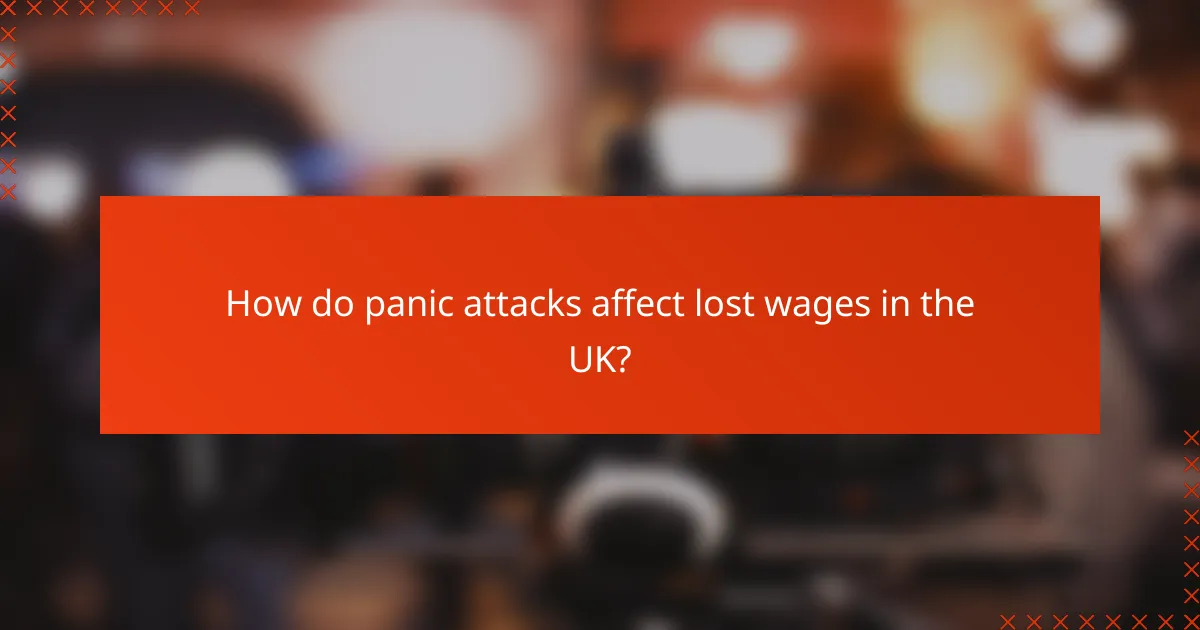
How do panic attacks affect lost wages in the UK?
Panic attacks can significantly impact lost wages in the UK by affecting an individual’s ability to work consistently. Many people experience increased absenteeism or even job loss due to the debilitating nature of these episodes, leading to financial strain.
Impact on employment status
Panic attacks can lead to changes in employment status, including reduced hours, temporary leave, or permanent disability. Employees may find it challenging to maintain regular attendance, which can jeopardize their job security. In severe cases, individuals may need to leave their jobs altogether, resulting in a loss of income.
Employers are increasingly recognizing mental health issues, but support may vary. Some companies offer mental health days or flexible working arrangements, while others may not provide adequate resources for affected employees.
Average wage loss estimates
The average wage loss for individuals experiencing panic attacks can vary widely, often ranging from a few hundred to several thousand pounds annually. Factors influencing this include the severity of the condition, the type of job, and the level of support available from employers.
Research suggests that individuals with mental health issues, including panic attacks, may earn significantly less than their peers, with wage losses potentially reaching up to 30% in some cases. This disparity highlights the importance of addressing mental health in the workplace.
Job retention strategies
To retain employment while managing panic attacks, individuals can adopt several strategies. Open communication with employers about mental health needs can foster understanding and support, potentially leading to accommodations like flexible hours or remote work options.
Additionally, seeking professional help, such as therapy or counseling, can provide coping mechanisms and improve overall well-being. Joining support groups or utilizing employee assistance programs can also enhance resilience and job security.
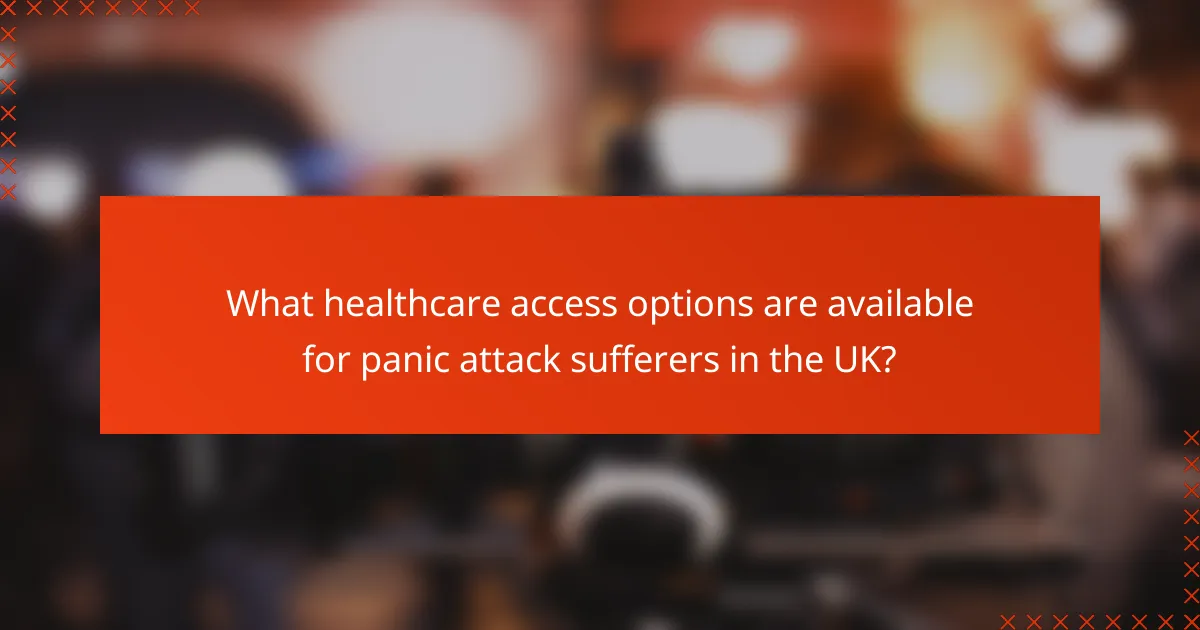
What healthcare access options are available for panic attack sufferers in the UK?
Panic attack sufferers in the UK have several healthcare access options, including NHS services, private healthcare, and community support resources. Each option varies in terms of cost, waiting times, and the type of support available.
NHS services for mental health
The NHS provides a range of mental health services for individuals experiencing panic attacks, including therapy and medication. Access to these services typically begins with a visit to a general practitioner (GP), who can refer patients to specialized mental health professionals.
Waiting times for NHS mental health services can vary significantly, often ranging from a few weeks to several months. Patients should be prepared for potential delays and consider alternative options if immediate support is needed.
Private healthcare options
Private healthcare offers quicker access to mental health services, including therapy sessions and consultations with specialists. Costs for private treatment can range from £50 to £200 per session, depending on the provider and location.
While private healthcare can provide faster treatment, it may not be affordable for everyone. Patients should weigh the benefits of immediate access against their financial situation and consider whether their insurance covers any private services.
Community support resources
Community support resources, such as local charities and support groups, can provide valuable assistance for those dealing with panic attacks. These resources often offer free or low-cost services, including peer support and workshops.
Individuals can find community resources through local health organizations or online directories. Engaging with these groups can help build a support network and provide coping strategies without the financial burden of formal treatment.
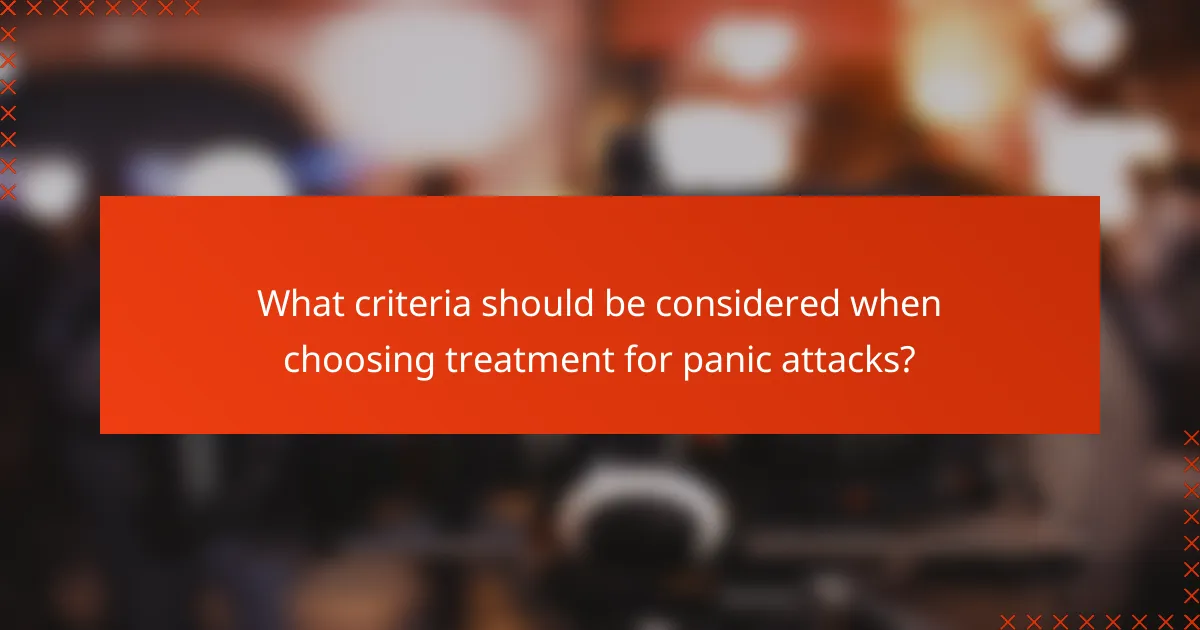
What criteria should be considered when choosing treatment for panic attacks?
When selecting treatment for panic attacks, consider effectiveness, patient preferences, and accessibility. These factors can significantly influence the success of managing symptoms and improving overall quality of life.
Effectiveness of different therapies
Various therapies for panic attacks include cognitive-behavioral therapy (CBT), medication, and mindfulness practices. CBT is often regarded as one of the most effective approaches, helping patients identify and change negative thought patterns. Medications, such as selective serotonin reuptake inhibitors (SSRIs), can also be beneficial, particularly for those with severe symptoms.
It’s essential to evaluate the effectiveness of these treatments based on individual responses, as some may find relief with therapy alone, while others may require a combination of therapy and medication. Regular follow-ups with healthcare providers can help in adjusting treatment plans as needed.
Patient preferences and needs
Understanding patient preferences is crucial in choosing the right treatment for panic attacks. Some individuals may prefer non-pharmacological approaches, such as therapy or lifestyle changes, while others may lean towards medication for quicker relief. Engaging in open discussions with healthcare providers about these preferences can lead to more personalized and effective treatment plans.
Additionally, considering the patient’s lifestyle, support systems, and previous experiences with treatment can help tailor the approach. For instance, someone with a busy schedule might prefer shorter therapy sessions or online therapy options.
Accessibility of treatment options
Accessibility plays a vital role in the treatment of panic attacks. Availability of mental health services can vary significantly by region, affecting the options patients have. In urban areas, there may be more therapists and support groups, while rural regions might have limited access to specialized care.
Insurance coverage is another critical factor; many plans cover therapy and medication, but the extent of coverage can differ. Patients should check their insurance policies to understand their benefits and any out-of-pocket costs they may incur. Exploring community resources, such as support groups or sliding scale clinics, can also enhance accessibility for those facing financial constraints.
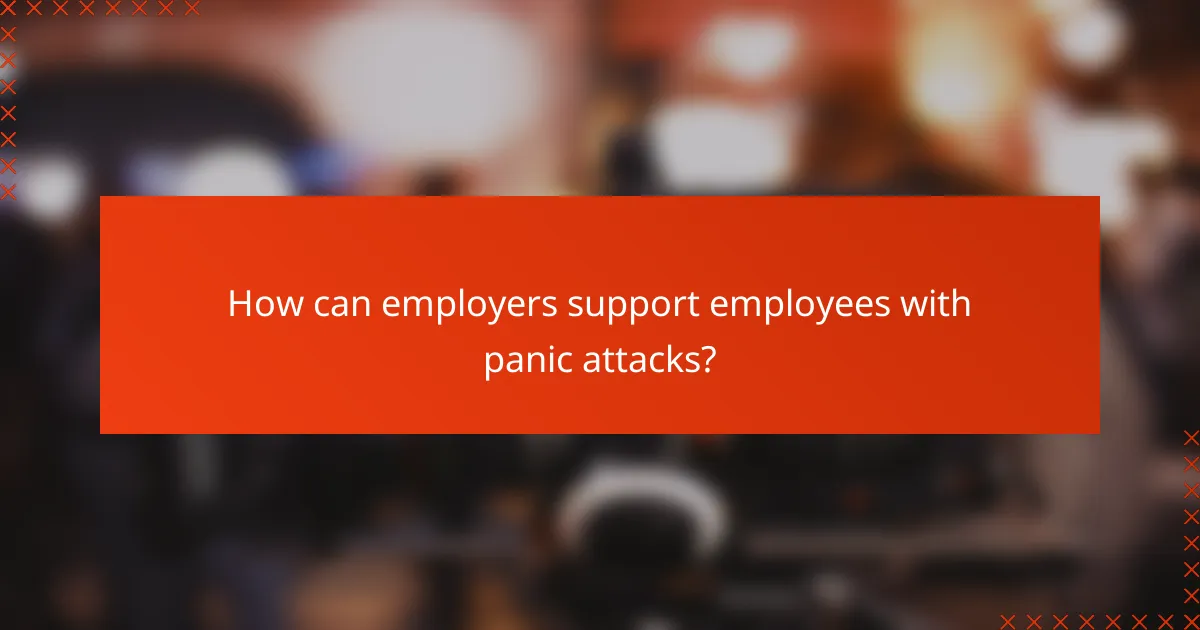
How can employers support employees with panic attacks?
Employers can support employees experiencing panic attacks by fostering a supportive environment and providing necessary resources. This includes implementing mental health policies, offering flexible work arrangements, and ensuring access to professional help.
Creating a supportive work environment
A supportive work environment is crucial for employees dealing with panic attacks. Employers should promote open communication, allowing employees to discuss their mental health without fear of stigma. Regular training for staff on mental health awareness can also help cultivate empathy and understanding among coworkers.
Additionally, creating quiet spaces for employees to take breaks can alleviate stress. Simple adjustments, such as flexible work hours or remote work options, can significantly reduce anxiety levels for employees prone to panic attacks.
Providing access to mental health resources
Employers should ensure that employees have access to mental health resources, such as counseling services or Employee Assistance Programs (EAPs). Offering comprehensive health insurance that covers mental health treatment can alleviate financial burdens associated with therapy and medication.
Employers might also consider hosting workshops or seminars on stress management and coping strategies. This proactive approach can empower employees with tools to manage their anxiety effectively.
Implementing flexible work arrangements
Flexible work arrangements can significantly benefit employees experiencing panic attacks. Allowing employees to work from home or adjust their schedules can help them manage their symptoms more effectively. This flexibility can lead to improved productivity and job satisfaction.
Employers should assess the feasibility of flexible arrangements on a case-by-case basis, considering the nature of the work and the individual needs of employees. Clear communication about expectations and responsibilities is essential to ensure that flexibility does not compromise team performance.
